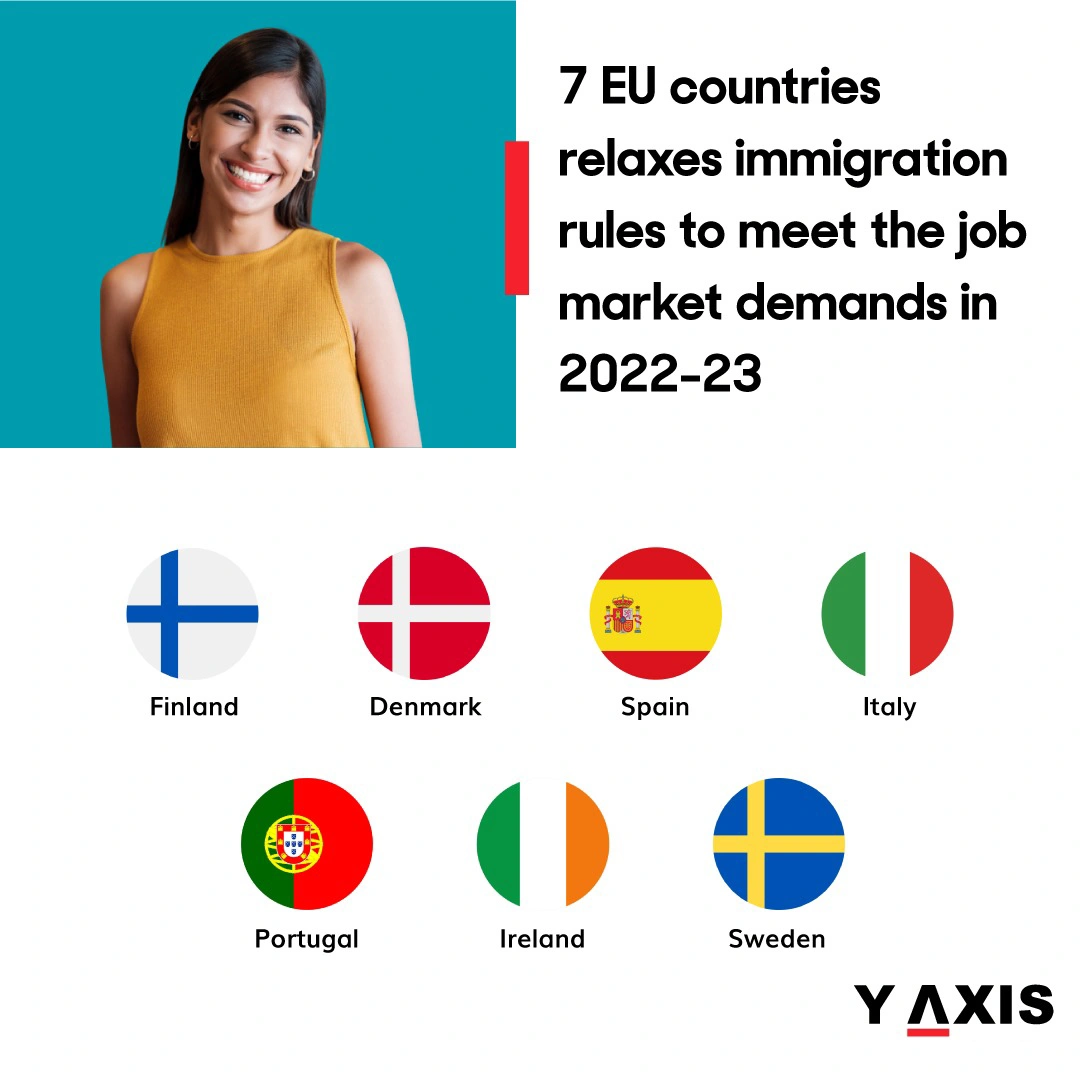Posted on September 02 2022
7 countries ease immigration rules to address labor shortages in Europe for 2022-2023
By , Editor
Updated November 03 2023
Key aspects of jobs in Europe
- Countries like Denmark, Sweden, and Finland are easing immigration rules to attract a high number of skilled workers
- An individual can work for 30 hours per week while studying in Spain
- Denmark Positive List is mainly for the Highly Educated and Skilled Workers
- 14 days of fast-track application processing in Finland
- Italy has expanded its yearly quota of work permits by 5,000 and is set to welcome 75,000 foreign workers in the year 2022
- Portugal has introduced a short-term work visa for foreign workers to work for a period of six months
- Ireland has introduced new changes to its Employment Permit System specifically for workers outside the European Economic Area (EEA)
- The foreign workers will not be expelled for minor errors instead, the employers failing to report the working conditions will be fined at the request of the Agency in Sweden
Overview:
A few European countries are known for their strict immigration laws, which specifically are against individuals who are looking for jobs to settle in Europe.
Fortunately, those days are eventually coming to an end, as countries like Denmark, Sweden, and Finland are easing immigration rules to attract and fascinate a higher number of skilled workers.
Also read...
France issued 270,925 residence permits in 2021
Work in Germany, France or Italy – Hottest jobs available in 5 EU nations now
Work and Settle in Europe
Many countries in the European Union are facing intense labor shortages that are to be filled internally, much like Australia and Canada. Contrary to these two countries, some of the European nations hold strict immigration laws, mostly against individuals seeking jobs.
Those days of strict immigration rules are passing by, as the countries like Denmark, Sweden, and Finland is easing immigration rules to attract and fascinate a higher number of skilled workers.
Significant changes in 7 EU countries
A few European countries are known for their strict immigration laws, which specifically are against individuals who are looking for jobs to settle in Europe.
Fortunately, those days are eventually coming to an end, as countries like Denmark, Sweden, and Finland are easing immigration rules to attract and fascinate a higher number of skilled workers.
Many countries in the European Union are encountering intense labor shortages that are to be filled internally, much like Australia and Canada. Contrary to these two countries, some of the European nations hold strict immigration laws, mostly against individuals seeking jobs.
Those days of strict immigration rules are passing by, as the countries like Denmark, Sweden, and Finland is easing immigration rules to attract and fascinate a higher number of skilled workers.
The seven significant changes that will help you find a job in Europe are mentioned below:
Denmark
Recently, Denmark has announced new lists of job roles in certain industries where foreign workers are most in-demand.
The two lists also called as the Positive List, are primarily for the Highly Educated and Skilled Workers which is expected to serve as a blueprint for the foreign workers who are hunting for jobs in Denmark.
Finland
Finland has accelerated and advanced in processing the applications of eligible start-up entrepreneurs and highly skilled workers along with their families within 14 days of time.
This country is currently providing students with a single residence permit until they complete their studies, wherein the students need not renew their Finnish residence permits every year and can enter Finland with their Long Term (D) visas without waiting for their residence permit cards.
This country is mainly inclined towards helping researchers and students live in the country by looking for jobs as soon as they graduate.
Read more...
Europe tourism and travel sector encounters 1.2 million job vacancies
Europe’s new residence permits rising stronger from the pandemic
Spain
Spain offers a more streamlined process for foreign nationals living in the country to acquire a work permit, reducing the application requirements for specific applicants.
The students from non-EU countries are eligible to:
- Can work for 30 hours per week while studying
- Work in the country immediately after graduation
Earlier, the students were supposed to wait for three years to get a job in this country and the Spanish government is planning to introduce a list of the most in-demand jobs that will be made available to foreign workers.
Italy
Italy has expanded its yearly quota of work permits by 5,000 and is set to welcome 75,000 foreign workers in the year 2022.
The Italian government has stated that “the work is in progress at the Cabinet to confirm the probability of speeding up the procedures, as there are high labor shortages in certain sectors.”
Portugal
The country has lately introduced a short-term work visa, allowing foreign workers to migrate to Portugal with the purpose of working only for a period of six months.
This short-term work visa is primarily issued for 120 days which additionally can be extended up to 90 days and the Portugal government has also declared the withdrawal of the quota regime for migration.
Ireland
The government of Ireland has announced the introduction of new changes to its Employment Permit System specifically for workers outside the European Economic Area (EEA) in the fall of 2022 as it plans to;
- Introduce new seasonal work permits
- Revise the labor market test process
- Create a more responsive system to address Ireland’s labor market
- Introduce an index for salary thresholds
Recently, the government has declared that doctors who have worked as doctors from the third countries in Ireland, will hold elections to apply for work without the necessity any requirements along with their spouses for a two to five years period.
For more information, visit the Y-Axis Blog Page…
Sweden
Sweden has made it more challenging for employers to employ foreign workers, making it compulsory for Swedish employers to mention any kind of changes in employment conditions and rules.
The foreign workers will not be expelled for minor errors, and employers who fail to report the working conditions for non-EU employees will be fined at the request of the Agency.
Willing to migrate to the EU from Australia? Get guidance from Y-Axis, the leading Overseas Consultant in Australia
If you found this article engaging, continue to read…
Tags:
Jobs in Europe
Work in Europe
Share

